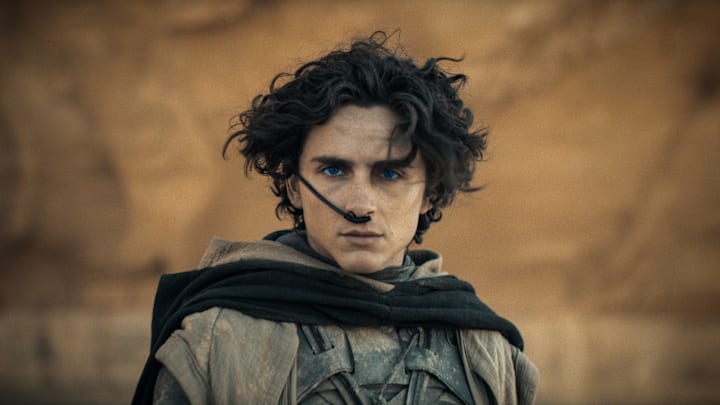This weekend, Warner Bros. Discovery will drop Dune: Part Two into theaters. I got to see the movie the other night, and I can tell you, it's a pretty spectacular watch. Deep, dense and ambitious, Dune: Part Two is the kind of big-brained Hollywood blockbuster that could become a giant hit.
And in Hollywood, giant hits means sequels. Directed by Denis Villenueve, the first two Dune movies are based on Frank Herbert's 1965 novel Dune. Herbert wrote five more Dune books before his death in 1986, and Villenueve has been open about wanting to make a follow-up movie based on the next book, Dune Messiah.
But Villenueve doesn't want to rush into things, which may frustrate the studio but is probably the right call. “There is absolutely a desire to have a third one, but I don’t want to rush it,” he told The Times of London. “The danger in Hollywood is that people get excited and only think about release dates, not quality.”
I agree with him completely. WBD has something unique with Dune: the series absolutely has the potential to be a blockbuster franchise, but unlike at Marvel Studios, where producers exert a level of top-down control that assures more movies are always in the offing, WBD is taking the old-fashioned route and leaving things more or less up to the director. That likely means we won't get new movies quickly, but when we do get them, they stand a better change of having real artistic and cultural heft. I'm all for that approach.
Also, WBD is still playing the franchise game; it's readying a TV show called Dune: Prophecy for later this year. But hopefully they can restrain themselves from going too crazy.
Dune Villeneuve thinks "movies have been corrupted by television"
At one point, Villenueve was going to direct an episode of that show, but things didn't work out. I don't think we should read into this too much, but Villeneuve has some criticisms of what television has done to the movies. “Frankly, I hate dialogue,” he said, raising eyebrows everywhere. “Dialogue is for theatre and television. I don’t remember movies because of a good line, I remember movies because of a strong image. I’m not interested in dialogue at all. Pure image and sound, that is the power of cinema, but it is something not obvious when you watch movies today. Movies have been corrupted by television.”
Villeneuve confirmed that he thinks this happened because movie executives thought they should take cues from our current Golden Age of Television, which has been going on since the 2000s, where one show after another comes along to take audiences by storm. “In a perfect world, I’d make a compelling movie that doesn’t feel like an experiment but does not have a single word in it either,” Villeneuve continued. “People would leave the cinema and say, ‘Wait, there was no dialogue?’ But they won’t feel the lack.”
I more or less get what Villeuneve is saying: when you're in a darkened theater with a giant screen, images have a power to move you in a way that they can't in your living room. And movies have gotten more dialogue-heavy in the past several years, although I attribute a lot of that to the rise of Marvel's brand of quip-speak, on display in movies like The Avengers.
Then again, I'm going to assume that Villenueve is exaggerating here, because there have always been movies that relied heavily on dialogue, from screwball comedies in the 1930s all the way through romantic comedies in the 1990s. And Villenueve might not remember dialogue from movies, but other people certainly do. "Here's looking at you kid." "I'm gonna make him an offer he can't refuse." "We're gonna need a bigger boat." C'mon, we could do this all day.
Dune director defends lengthy runtime
There's been some discourse over the length of Villenueve's Dune movies, which surprised me a bit, since at 2 hours and 46 minutes, Dune: Part Two is long, but it's not absurdly long for an epic of this kind. After 3 hours and 26 minutes of Killers of the Flower Moon, you have to work pretty hard to exhaust me at the movies. Together, the two Dune movies run about five-and-a-half hours, but they're two different movies, so I wasn't bothered.
“I trust the audience,” Villeneuve said. “This story’s too dense. I would never make ‘Dune’ as one movie. This was the only way I could succeed.”
"Also, think of Oppenheimer. It is a three-hour, rated-R movie about nuclear physics that is mostly talking. But the public was young — that was the movie of the year by far for my kids. There is a trend. The youth love to watch long movies because if they pay, they want to see something substantial. They are craving meaningful content."
Incidentally, I looked up Villenueve's kids and at least one of them is a full-grown adult approaching 30, so if you have an image in your head of a bunch of tweenagers watching Oppenheimer, you can set it aside.
Dune: Part Two drops in theaters this Friday, March 1.
To stay up to date on everything fantasy, science fiction, and WiC, follow our all-encompassing Facebook page and sign up for our exclusive newsletter.
Get HBO, Starz, Showtime and MORE for FREE with a no-risk, 7-day free trial of Amazon Channels
h/t Variety
